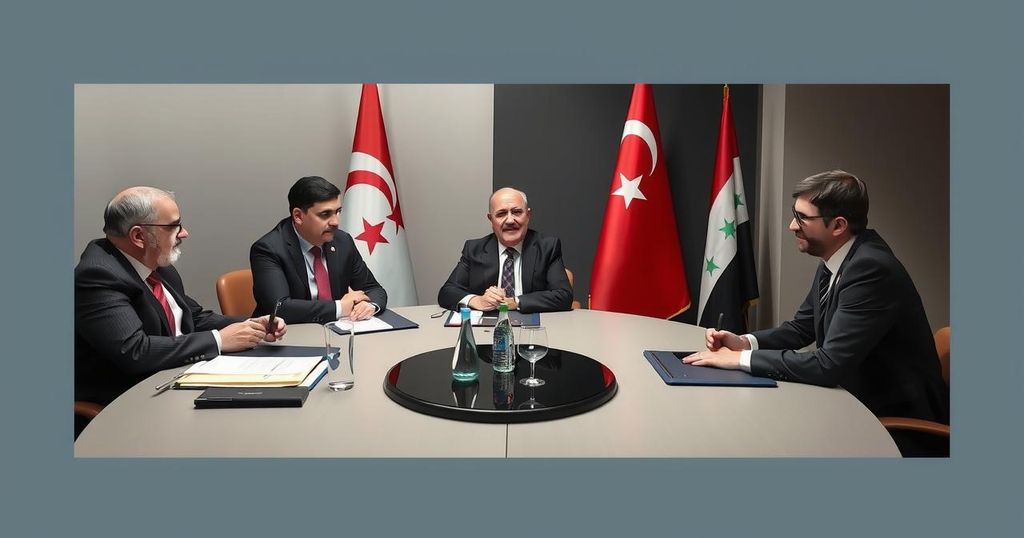Egyptian President Al-Sisi highlights the importance of Syria’s unity and urges a comprehensive political process during talks with Cyprus. Turkish President Erdoğan advocates for international cooperation in Syria’s reconstruction while addressing security concerns. The Syrian Negotiation Commission emphasizes transitional justice, and the UN calls for an inclusive political transition amid dire humanitarian needs. France re-engages diplomatically, urging inclusivity in political processes as it raises its flag over its embassy in Damascus after years of closure.
In a recent phone call with Cypriot President Nikos Christodoulides, Egyptian President Abdel Fattah Al-Sisi underscored the significance of preserving Syria’s territorial integrity and called for an inclusive political process that engages all segments of the Syrian populace. His remarks align with a broader sentiment among international leaders regarding Syria’s future amid the ongoing challenges post-Assad regime turmoil.
On the same day, Turkish President Recep Tayyip Erdoğan advocated for global collaboration in Syria’s reconstruction. He emphasized Turkey’s commitment to countering terrorist threats, primarily targeting the Kurdish factions that operate within Syria. Erdoğan stated, “Turkey is combating terrorist organizations to protect its national security and end the state of instability in Syria as quickly as possible.” His comments reflect Turkey’s precarious position as it seeks to stabilize the region while addressing internal security concerns.
Bader Jamous, the head of the Syrian Negotiation Commission, asserted that pursuing transitional justice in Syria is essential. During a United Nations Security Council meeting, he advocated for the establishment of a national transitional government that accurately reflects the diverse Syrian society. He also called for a national conference to create a new constitution and promote free elections, nimbly adhering to the tenets of Security Council Resolution 2254. Jamous remarked, “We believe that the spirit of Security Council Resolution 2254 constitutes a roadmap for achieving the aspirations of the Syrian people.”
In relation to international discussions, Russia’s representative to the Security Council observed that Israeli forces are encroaching close to Damascus, emphasizing the need for Syria to maintain its state institutions while calling for the lifting of sanctions. Concurrently, the UN Special Envoy Geir Pedersen highlighted that a significant political transition is necessary to secure international economic support for Syria.
The humanitarian crisis in Syria remains dire, with UN officials noting that over 70% of the population requires assistance. Tom Fletcher, the UN Under-Secretary-General for Humanitarian Affairs, reported alarming conditions, asserting that more than one million Syrians have been displaced in recent weeks, amidst severe shortages of crucial supplies.
On the diplomatic front, the French Ministry of Foreign Affairs confirmed that its diplomatic mission has engaged with newly appointed representatives of the Syrian transitional authorities. Paris emphasized the need for an inclusive approach to political transition, raising its flag over its embassy in Damascus to signify renewed engagement. French officials highlighted their focus on security issues, particularly the fight against ISIS, marking a cautious step toward rekindling relations after a prolonged period of dormant diplomatic ties.
The ongoing crisis in Syria has drawn international attention, particularly as various nations navigate complex political landscapes following the ousting of Bashar Al-Assad. Various leaders have expressed the importance of Syria remaining unified and have emphasized the need for an inclusive political process that reflects the wishes and needs of its diverse population. Amidst the backdrop of ongoing humanitarian challenges, calls for reconstruction and transitional justice emphasize the delicate balance required for Syria’s stability.
The collective discourse surrounding Syria’s future emphasizes a unified approach towards political reconstruction and humanitarian assistance. Leaders across the globe endorse the necessity of collaborative efforts to ensure stability while serving the diverse needs of the Syrian people. The insistence on transitional justice by Syrian representatives underscores a critical path towards restoring governance and addressing past grievances, which is essential for the viability of any future governance framework.
Original Source: www.dailynewsegypt.com







